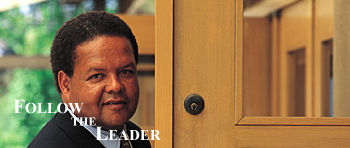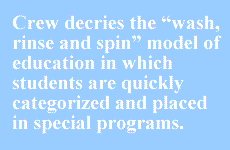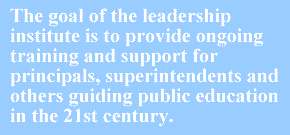
Making a Big Difference in the Big Apple
Crew's résumé could be titled "Been There, Done That." As a teacher, principal, assistant superintendent and superintendent in cities from coast to coast, Crew has acquired a wealth of professional and political knowledge about how to run effective schools.
"If you were to go out and say we're looking for superintendent candidates, give me five names from around the country, he'd be one of them," says Glenn.
Crew was superintendent in Sacramento when Tacoma came knocking in 1993. "He came in charged by the board to raise student achievement," recalls Gay Campbell, the Tacoma School District's former director of community relations. "He was very insistent that would happen."

One of his first moves was to bring the Efficacy Institute to Tacoma to help establish a culture of high expectations among staff. The institute's guiding premise is that if a child can master language by age 3, he or she can succeed in school, explains Campbell.
Besides raising expectations, Crew worked to align the district's curriculum more closely with its assessments and strove to teach students how to prepare for and take standardized tests.
Not everyone went along. "He was trying to change schools," says Campbell. "I'm sure if you really searched, you could find people who were threatened by that."
For the most part, however, the school board and community were impressed, says Campbell. Unfortunately for Tacoma, so was the New York Board of Education. "Basically, they came after him," says Campbell.
Crew's jump to the Big Apple created some hard feelings in Tacoma. "When he came in, many people thought he would stay four or five years," says Campbell. "There were people who felt he had not completed the work he started in Tacoma."
At the time, Crew called the opportunity to become chancellor in New York "the crown jewel" of his career. And even though he's been gone for nine months, a piece of his heart remains in Gotham.

One afternoon last spring, the phone in his office at the leadership institute wouldn't stop ringing as former colleagues and reporters kept calling from New York to talk about the test results that had been released earlier that day.
"They're up," Crew explained to his visitor. "All 32 school districts. This is the third time it's happened in my term." He paused. "My previous term."
Saying all children can achieve is one thing. Making it happen is another. Rising test scores are just one side of success. For Crew, it all begins with giving kids confidence they can learn. But it doesn't stop there. In New York, he:
- Closed some schools until they submitted educational "redesign" plans.
- Ended automatic promotion of students.
- Created after-school and summer literacy programs.
- Reduced class size in the early grades.
- Made literacy improvement part of the evaluation process for superintendents, principals and teachers.
It was significant change for a school system with 32 districts, 1,100 schools, 75,000 teachers, 1.1 million students—and one thorny mayor.
To the surprise of many, Crew and Giuliani forged a congenial and productive relationship, sharing cigars, attending ballgames together and even playing an April Fool's Day joke on their aides by secretly trading places at one another's staff meetings.

Even so, history dictated the honeymoon would not last forever. "Nobody can be chancellor of the New York school system for long," says McCormick. "It's too tough of a job."
The chancellor serves at the pleasure of the New York school board. And board members are political appointees—with two of the seven members appointed directly by the mayor. As a result, chancellors must negotiate a political minefield. Sooner or later, even popular leaders such as Crew fall victim.
Crew "fell out of favor," a euphemism for getting fired, when he steadfastly opposed Giuliani's desire to introduce an experimental voucher program.
As he set the stage for a run at the U.S. Senate, Giuliani echoed the Republican Party's enthusiasm for using public funds to help low-income parents pay for private school tuition. Calling it "the most important thing that has to be done with education in America," Giuliani said vouchers would create competition that would force public schools to improve.
Crew's objection was simple: diverting tax dollars to private education could set a precedent that would spell the beginning of the end for public schools, which in many cases already are underfunded.